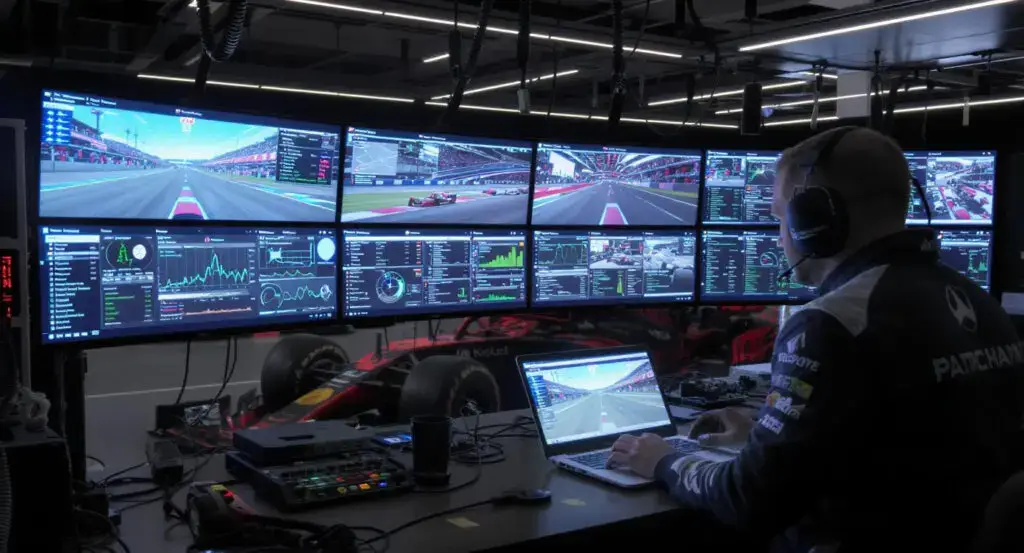As engines roar this weekend at the MSC Cruises Austrian Grand Prix, Formula One’s cutting-edge technology will be quietly working behind the scenes, turning every millisecond into meaningful insights. Thanks to the collaboration with Amazon Web Services (AWS), Formula One is undergoing a data revolution, transforming not just what happens on the track, but also how fans around the world experience the sport.
Every F1 car today brims with around 300 sensors, generating 1.1 million telemetry data points per second. These are transmitted in real-time to the pits and beyond, a far cry from the sport’s early days 75 years ago, when a stopwatch was the sole tool of measurement. Now, artificial intelligence (AI) and cloud computing interpret this deluge of information, helping teams squeeze out critical performance gains that can mean the difference between winning and losing.
Milliseconds Matter: The Race for Data-Driven Performance
“Today, there are copious amounts of data collected, and so artificial intelligence and machine learning are key to making sense of it all,” says Julie Souza, who leads AWS for sports. Souza highlights how insights from even minute details, like over-rotating a lug nut that could destabilise an engine, can give teams such as Scuderia Ferrari, an AWS partner since 2021, a competitive edge.
One breakthrough has been in aerodynamics. Using computational fluid dynamics, simulations run on AWS cloud infrastructure revealed that trailing cars struggled with overtakes due to disrupted airflow. The data led to significant car design changes introduced in 2022, boosting overtakes by more than 30 percent and making races dramatically more exciting for fans.
Driving Fan Engagement with Deeper Data
It’s not just the teams that benefit from all this data. Fans are reaping rewards too. Souza explains that technology now lets viewers customise their experience, choosing camera angles, audio feeds, buying merchandise, or ordering food right from their device mid-race.
“Over the past few years, we’ve seen fans are more connected and engaged with their favourite sports when there is more data and deep insights, which helps them better understand and appreciate what they’re watching,” Souza says.
The results speak for themselves: AWS’s work with the Bundesliga has led to a 68 percent increase in fan engagement and 60 percent longer app session times. Souza credits this to the power of feeling “smart” about what you’re watching, which keeps audiences coming back for more.
Changing the Game for Broadcasters
Data’s influence goes far beyond the racetrack or app interfaces. Adrian De Luca, AWS Director of Cloud Acceleration for Asia Pacific and Japan, says data is also revolutionising live broadcasting.
“Tracks can be six kilometres in length, and so the action is happening in a wide expanse and at the same time, and so data collected and packaged by AWS helps producers tell the story about what’s going on,” De Luca says.
Telemetry from each car is picked up by beacons placed every 150 to 200 metres, then relayed to F1 headquarters in Biggin Hill, UK. This information allows broadcast teams to anticipate dramatic moments like overtakes so they can prep replays or graphics in advance. Over a single race weekend, more than 500 terabytes of data are generated, a volume that only cloud infrastructure can handle efficiently.
Beyond F1: Lessons from Other Sports
AWS’s innovations aren’t limited to racing. In the NFL, 500 million data points are analysed each week to predict player injury risks, resulting in 700 fewer missed games last season. In another example, helmet sensors revealed that players in different positions suffer different impacts, prompting the creation of eight helmet types tailored to reduce concussions.
Meanwhile, the NHL and AWS pioneered the first cloud-based broadcast in March 2024, cutting CO₂ emissions by more than two metric tonnes by reducing the need for on-site gear. And in golf, Souza notes that while only 15 percent of PGA Tour shots make it onto TV, apps powered by AI can now showcase the remaining 85 percent complete with auto-generated commentary in multiple languages.
The Road Ahead: Data as the Ultimate Game Changer
Whether it’s fueling faster laps in F1, keeping NFL stars on the field, or giving fans control over their viewing experience, AI and cloud computing are rewriting the script for how sports are played, watched, and enjoyed.
“Technology allows fans to curate their own viewing experience in a way that’s highly personal to them,” says Souza. “What’s interesting to me may not be relevant to you, and so data is unlocking true personalisation for a more engaging experience.”
As sports and technology continue to converge, it’s clear that in today’s high-speed world, data isn’t just driving athletes; it’s steering the future of fandom itself.























